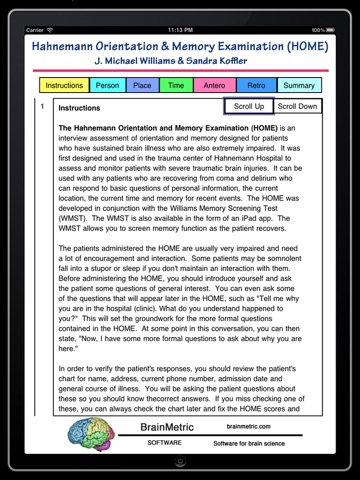
The Hahnemann Orientation and Memory Examination (HOME) is an interview assessment of orientation to person, place and time, anterograde memory and retrograde amnesia designed for patients who have sustained brain illness who are extremely impaired. It was first designed and used in the trauma center of Hahnemann Hospital to monitor patients with severe traumatic brain injuries. It can be used with patients who are recovering from coma and delirium who can respond to basic questions of personal information, the current location, the current time and memory for recent events. After you administer the HOME, the program will compile the scores and report them on the summary page. You can then save the response on your iPad or email them to your account. Since the HOME includes the questions asked on the Galveston Orientation and Amnesia Test (GOAT), the program also calculates a GOAT score. The HOME was developed in conjunction with the Williams Memory Screening Test (WMST). The WMST is also available in the form of an iPad app. The WMST allows you to screen memory function as the patient recovers.
Levin, H. S., Benton, A. L., & Grossman, R. G. (1982). Neurobehavioral consequences of closed head injury. New York: Oxford University Press.
Williams, J. M., Gomes, F., Drudge, O. & Kessler,M. (1984). Predicting outcome from closed head injury using early severity measures. Journal of Neurosurgery, 61, 231-235. Reprinted in The Yearbook of Critical Care.
Williams, J. M., (1990). The Neuropsychological Assessment of Traumatic Brain Injury in the Intensive Care and Acute Care Environment. In C. J. Long, & L. Ross (Eds.), Traumatic Brain Injury, New York: Plenum.


